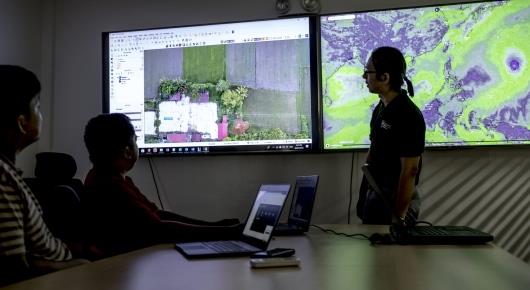FAO, CTA help agriculture tap into the power of digital data

The future of farming indicates that one day digital assets will enjoy almost the same level of recognition and value as physical ones – especially if we foresee a sustainable path for the sector. Farmers cannot do agriculture without land, but neither can they do agriculture without up-to-date data on soil and crop conditions, weather, pests and diseases, and many other factors.
The power of digital data, especially big data, to transform smallholder agriculture is the topic of an expert panel today, organized jointly by the Technical Centre for Agricultural and Rural Cooperation (CTA) and the Food and Agriculture Organization of the United Nations (FAO). The event is part of the Global Forum for Food and Agriculture (GFFA), which takes place every January in Berlin. This year’s theme is “Agriculture goes digital – Smart solutions for future farming.”
Agriculture should become more data-driven to back farmers’ decision in critical moments; these decisions have the potential to benefit the lives of about 500 million smallholders worldwide. Making these changes possible are the aggregation of information from farmers’ profile data, data from farm droids and satellites, and weather data. Big data has the potential to bring data fragments, resources and service providers together in the support of farmers and agriculture in general.
A digital farmer profile unites comprehensive data on a farmer and his or her farm. Through these profiles, and with relevant apps for smart digital devices, farmers can access crop modeling, rainfall and soil information, among many other data services.
At the same time, as today’s event pointed out, there is no consensus on many issues, including who should manage farmer data and how that data should be governed.
“Farmers’ concerns are often the same as consumers’ worries about the security and privacy of their data,” said Raimund Jehle, Deputy Head of FAO’s Regional Office for Europe and Central Asia, in his speech kicking off the event. Jehle pointed at the fact that although agriculture has vast information potential, the sector hasn’t been fully digitalized yet.
“Digitalization in agriculture, which brings together the power of big data analytics, the benefits of digital services and solutions, and the promise of business developments, can be a strong catalyst for increased productivity, improved income, climate resilience, and the inclusion of women and youth for smallholder agricultural transformation,” said CTA’s Benjamin Addom in the keynote speech at the panel.
Big data is penetrating and altering all spheres of human life. Economist and former Deputy Minister of Agriculture of Armenia Armen Harutyunyan, who moderated the event, called our time a “critical moment” to reassess the role of data in production, storage, export and marketing of agricultural produce and to ensure that technologies help farmers become more efficient and sustainable.
To present the issue in its complexity, the panel brought together four experts with varied experience: Theo de Jager, president of the World Farmers Association; Ingabire Mamy, a social entrepreneur who now runs the the first licensed drone start-up in Rwanda; Lorenzo de Simone, an international expert in geospatial technology, working recently on an FAO project on an early crop yield forecast system in Africa; and Nasir Yammama, a creative technologist and entrepreneur who manages his agricultural value-chain start-up in Nigeria.
As Simone noted, improved accuracy, granularity, availability, and integration, along with lower access costs, can make geospatial data and technology part of the solution for the main challenge of today’s agriculture: to sustainably produce more with less.
Mamy emphasized the “vital” role of digitalization in smallholder agriculture in achieving the Sustainable Development Goals and achieving better yields. “In addition,” she added, “agriculture facilitated by technology will continue to be the main source of employment for youth.”
The expert panel also elaborated on the specific challenges of earth observation data for smallholder farmers and the role of international organizations in democratizing the use and analysis of geospatial data.
“We need to create – immediately – the infrastructure and mindset of popularizing data-enabled farming, investing and even policymaking,” emphasized Nasir Yammama. “Good agricultural data provide ground for sound decisions for all actors of the agricultural value chain, from farmers to governments and agribusinesses.”
17 January 2019, Berlin, Germany
